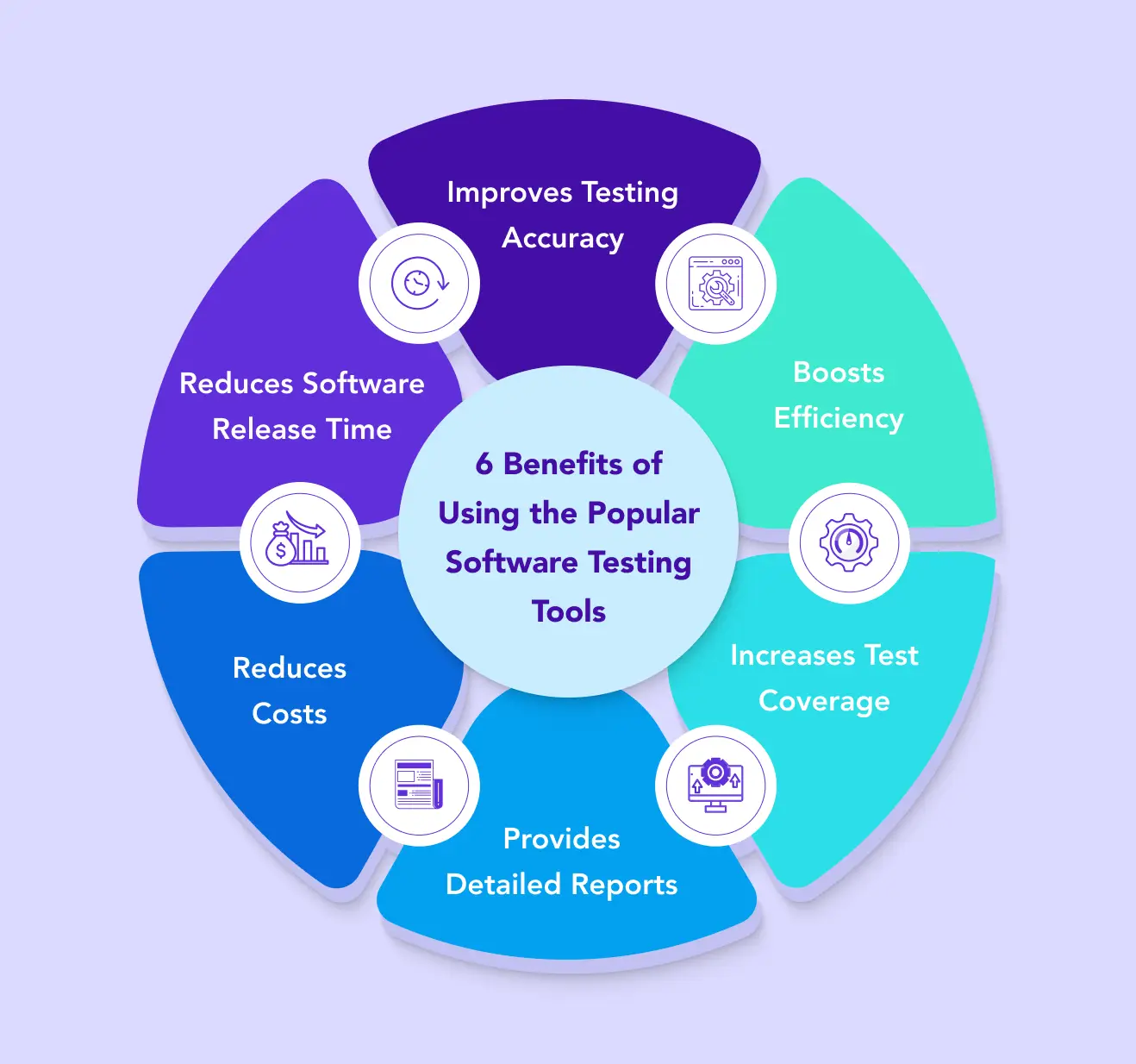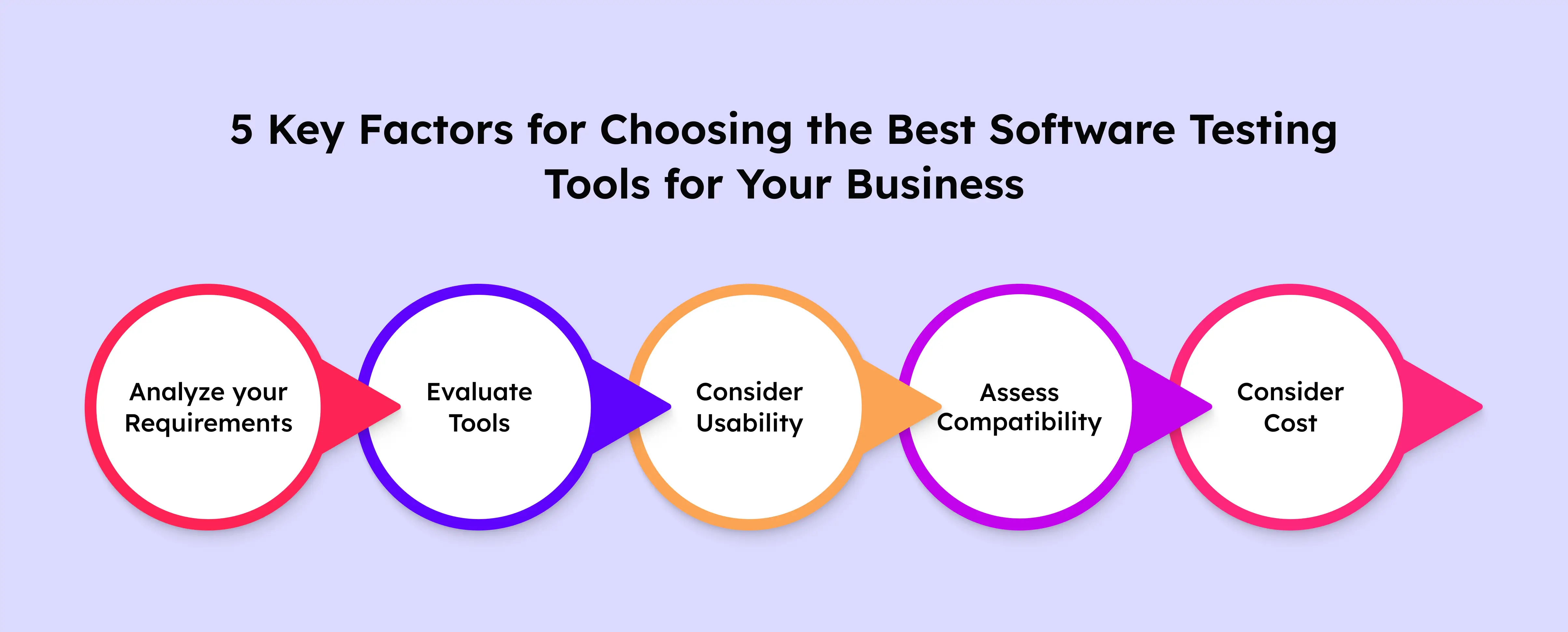Software quality is a major issue and a leading reason for the failure of software projects.
Software testing and quality assurance have become critical aspects of the software development life cycle. There are various types of software testing such as unit testing, functional testing, integration testing, regression testing and many others.
Automated software testing tools have become indispensable in software testing as they significantly improve the efficiency and accuracy of testing and minimize human effort to ensure quality.
But with so many software testing tools available these days, choosing the right one has become a challenge. In this blog, we pick up the top software testing tools to help you find the perfect one for your software project.
This Article Contains:
What are Software Testing Tools?
Software testing tools are applications used by software developers, testers, and QA teams to identify and remove defects, and bugs and improve overall software quality. Developers and QA professionals use them throughout the software development lifecycle to remove coding errors and ensure the software delivers high performance and superior user experience. Tools like Selenium, Appium, and Katalon are some of the top software testing tools.
Best Software Testing Tools for 2024
Here is a list of software testing tools based on their effectiveness, popularity, and user-friendliness.
1. Selenium
Selenium is one of the most popular software testing and a go-to automation testing platform for Quality Assurance (QA) engineers. It is an open-source framework that supports all the popular programming languages and provides tools for different automation needs. Quality Analysts across the globe use this tool as it offers customizable test automation in multiple languages.
Features
It supports testing across different browsers including Chrome, Safari, Firefox and Edge.
It also offers testing for popular programming languages like Java, Python, JavaScript, C#, Ruby and others.
This tool can handle large and complex test suites, making it one of the top software testing tools.
It can execute tests much faster compared to other testing tools.
It provides support for CI/CD tools, making it a great fit for the Agile development environment.
If you want to know more about the Agile Software Development Method, consider reading our blog, “Ultimate Guide to Agile Software Development”.
Integrations and Supported Platforms
OS: Windows, MAC, Linux etc.
Top Integrations: TestNG, JUnit, Cucumber, Azure DevOps etc.
2. Appium
Appium is among the top software testing tools for the automation of mobile applications. It is a cross-platform mobile automation tool that allows QA engineers to run the same test on multiple platforms.
Appium is suitable for testing native, hybrid as well as web applications. Like Selenium, Appium also supports multiple programming languages such as Java, Objective C, Python, Ruby, JavaScript with NodeJS, and others that have Selenium client libraries.
Features
Apium is an open-source tool which means you can use it for free.
It supports multiple platforms, i.e., you can run the same test cases on various platforms.
Appium works without accessing the application source code or library.
It seamlessly integrates with continuous integration and delivery tools.
Integrations and Supported Platforms
OS: iOS, Android, Windows, MAC, Linux etc.
Top Integrations: TestNG, Pytest, JUnit, Cucumber etc.
3. TestComplete
TestComplete is among the best software testing tools for desktop, mobile, and web applications. It supports multiple scripting languages like Javascript, VBScript, and Python. With in-built support for over 500 third-party frameworks, TestComplete can manage dynamic UI elements in the most available technologies.
Features
It supports open integration with CI/CD tools like Jenkins, GIT, Zephyr, etc. through plugins.
You can run several tests across different virtual machines.
The built-in code editor enables testers to write scripts manually.
It has a user-friendly interface to create and run tests effortlessly.
Integrations and Supported Platforms
OS: Windows and MAC.
Top Integrations: Jenkins, TeamCity, Zephyr, etc.
4. LambdaTest
LambdaTest is another popular name in the list of software testing tools. It is a cloud-based AI-powered cross-browser testing platform that allows you to evaluate how a web application responds when accessed through different browsers. Using this platform, you can perform tests manually or integrate automation tools like Selenium, Appium, and others to run automated tests.
Features
It allows you to reduce the test execution time and complete tests much faster.
It supports responsive testing by providing tools to check website functionality across different screen sizes.
As LambdaTest is cloud-based, it offers easy scalability allowing testers to scale testing efforts up or down.
It supports running Selenium scripts in different browsers enabling testers to improve the test efficiency.
It offers a cost-effective subscription-based model which is a great option for businesses with limited resources.
Integrations and Supported Platforms
OS: Windows and MAC.
Top Integrations: Jira, Testsigma, Gitlab, Katalon etc.
5. TestRail
TestRail is a cloud-based test case management tool used by QA, testers, and developers to manage, track, and organize software testing. This platform provides customizing options to optimize testing processes according to the specific project requirements. Its interactive dashboards, metrics, and comprehensive activity reports provide testers with up-to-date information on the test progress.
Features
It empowers you to manage both manual and automated testing efficiently.
It boosts test efficiency with personal to-do lists and milestones.
The intuitive user interface ensures smooth navigation and ease of use.
Since it is web-based, you can set it up quickly on the web or install it on your server.
It facilitates the quick recording of test results through screenshots, attachments, and defect reports.
Integrations and Supported Platforms
OS: Windows and MAC.
Top Integrations: Jira, GitHub, Jenkins, Selenium, JUnit, etc.
6. Katalon
Katalon is a comprehensive AI-powered application testing platform that offers end-to-end testing for web and mobile applications. Its user-friendly interface and built-in templates simplify the test creation process, allowing testers to create and execute automated tests without extensive programming knowledge. With its robust reporting and analytics features, teams can gain valuable insights into test results.
Features
Katalon allows you to create reusable elements for enhanced test maintenance.
It supports multiple scripting languages, including JavaScript, Groovy and others.
The platform provides automation support for different projects and team sizes.
Its built-in reporting and analytics feature helps you get detailed test reports and track test results.
Integrations and Supported Platforms
OS: macOS, Windows and Linux.
Top Integrations: AppDynamics, Codemagic, Jira, Jenkins, GitLab etc.
7. Testpad
Testpad is a preferred choice among the top software testing tools for many testers and QA professionals. It is designed to enhance manual testing workflow with a checklist approach. With a checklist-inspired test plan, the tool provides you with prompts on what to check, helping you to write, rewrite and organize your test according to your preference.
Features
It comes with a keyboard-driven editor, enabling testers to type hundreds of test prompts in minutes.
It generates reports instantly, helping you get a quick overview of test progress.
You can share guest access links with your clients and stakeholders.
A zero learning curve means it is user-friendly and suitable for use by non-testers.
Integrations and Supported Platforms
OS: macOS, Windows, and Linux.
Top Integrations: GitHub, Jira, Jenkins, GitLab, etc.
8. Postman
Postman is another popular automation testing platform that offers a comprehensive API testing tool. It allows testers to write various tests including functional, integration, and regression tests, and execute them in CI/CD pipelines with command lines. From initial design to testing and documentation, this tool empowers developers with end-to-end testing, making it one of the top software testing tools.
Features
Postman provides a user-friendly interface equipped with code snippets.
It allows you to manage the order in which requests will be executed.
This tool is by default integrated with built-in external libraries to use in the prerequisite and test script tabs.
It has built-in GraphQL which makes it easier to work with GraphQL APIs.
Integrations and Supported Platforms
OS: macOS, Windows, and Linux.
Top Integrations: Datadog, GitHub, Workato, Jenkins, GitLab, etc.
9. SpiraTest
SpiraTest is another name that comes to mind when you look for popular software testing tools. This comprehensive software testing platform can manage the complete testing process from start to finish. Its powerful automation and integration features help testers streamline the testing process and improve software quality.
Features
This platform allows you to manage test cases and runs in exploratory and manual testing.
It supports devices of all sizes including mobile, desktop, and tablets, and also it provides a 100% responsive user interface.
It is available as both an on-premise setup and a cloud-based version.
It offers a comprehensive bug-tracking solution to manage the complete testing process.
Integrations and Supported Platforms
OS: Android, iOS, MAC, Windows and Linux.
Top Integrations: Jira, Azure DevOps, QuickTestPro, QTP etc.
10. Kobiton
Kobiton is a complete mobile app testing solution and is among the top software testing tools. This platform enables QA teams to test mobile applications on in-premise and cloud. Kobiton provides testers with all the devices and operating systems to scale their testing limit without affecting efficiency.
Features
This tool provides you access to real mobile devices, ensuring better test coverage.
It enables users to quickly identify and resolve performance issues, improving the overall app quality.
This tool integrates with the most popular CI/CD tools, improving the development process.
It can be deployed on-premise behind your firewall with no outside access.
Integrations and Supported Platforms
OS: Android, iOS, Windows, and MAC.
Top Integrations: Jira, Jenkins, HockeyApp, TestRail, Katalon etc.
11. UFT
Unified Functional Testing (UFT) is a widely used testing tool that can perform automated functional testing without regular system monitoring. This tool is primarily used for functional, service, and regression testing, UFT can automate tests for web, desktop, and even mobile applications (with additional tools). With its intuitive interface, easy learning curve, and robust capabilities, UFT has emerged as one of the most famous software testing tools in 2024.
Features
UFT uses VBScript, a simple and easy scripting language suitable for beginners.
It generates reports that help you get insights for analytical purposes.
It supports major software applications including SAP, Salesforce, Java, Oracle and others.
Integrations and Supported Platforms
OS: Windows.
Top Integrations: Jira, Zephyr, Jenkins, Test Director, Quality Center, WinRunner etc.
6 Benefits of Using the Popular Software Testing Tools
There are several benefits of using the popular software testing tools. Let us look at the top six benefits.

1. Improves Testing Accuracy
Software testing tools significantly reduce errors in testing. They help in identifying bugs and errors quickly, and perform the same steps accurately every time, reducing the chances of human error in manual testing.
2. Boosts Efficiency
By Automation testing, software testing tools automate the repetitive task which reduces the testing time from days to hours and increases test accuracy. These tools enhance test coverage, facilitate faster defect resolution, provide actionable insights, and ensure the delivery of high-quality software.
3. Increases Test Coverage
Software testing tools increase the scope of tests by creating and executing a wide range of tests. It allows you to test how your software will perform across various platforms, browsers, and devices, ensuring comprehensive testing that is difficult to achieve through manual testing.
4. Provides Detailed Reports
All the popular software testing tools generate detailed testing reports and insights upon executing the tests. This helps testers and other QA professionals identify defects and analyze the results, facilitating continuous improvements and improving decision making.
5. Reduces Costs
Leveraging the best software testing tools helps catch bugs, errors, and defects early during development. These platforms also improve the efficiency of test execution and help avoid the error fixing cost, thus reducing overall project costs.
6. Reduces Software Release Time
The efficiency and accuracy of software testing tools reduces the software testing time and the overall software development cycle. This helps businesses to release the software faster in the market.
5 Key Factors for Choosing the Best Software Testing Tools for Your Business
Choosing the best software testing tools for your business needs, it requires you to consider several factors. Here are the most critical factors.

1. Analyze your Requirements
The first and foremost thing you need to consider before picking a software testing tool is analyzing your requirements. This includes application type, testing needs (functional, performance, security, etc.), your team's skills, and familiarity with the tools.
2. Evaluate Tools
Once you identify your needs, you can research and analyze different testing platforms including their features, functionalities, performance, and other factors to shortlist top software testing tools that best suit your needs.
3. Consider Usability
Before choosing a software testing tool, you must ensure the platform is user-friendly and offers an intuitive user interface. It will help your team to use the tools efficiently and they can perform tests quickly without extensive training and support.
4. Assess Compatibility
This is another crucial factor to consider when selecting the best software testing tools. Select a tool that is compatible with the software development environment, existing tools, and other test management systems to ensure smooth workflow, data sharing, and collaboration.
5. Consider Cost
Every software is an investment for your business and you must ensure it offers the best ROI. So, when selecting a testing tool, consider the budget and all the expenditures like license & maintenance fees, and other costs. Make sure you choose an efficient yet cost-effective testing platform that gives you the best testing solution for your project.
Wrapping Up
Using software is essential for every business, but it should be efficient and user-friendly to streamline your business operations and improving user satisfaction. Selecting the right testing tools can significantly improve their testing processes and enhance the software quality.
Whether you are looking for automation-driven tools or comprehensive test management platforms, we have listed the top software testing tools, their features, and integrations to help you select the best one for your needs.
At Mayura Consultancy Services, we understand the importance of software testing in delivering high-quality software. Our experienced testers can help you select the right tool and guide you through the testing process. Contact us today to discuss your software project requirements.
Frequently Asked Questions
Software testing is important for any business as it helps in removing bugs and defects from the software.
To determine which software testing tool is best suited for your software project, it requires you to consider various factors such as analyzing your requirements, your team's capability, budget, compatibility with other tools and platforms etc.







Comments
Share Your Feedback
Your email address will not be published. Required fields are marked *